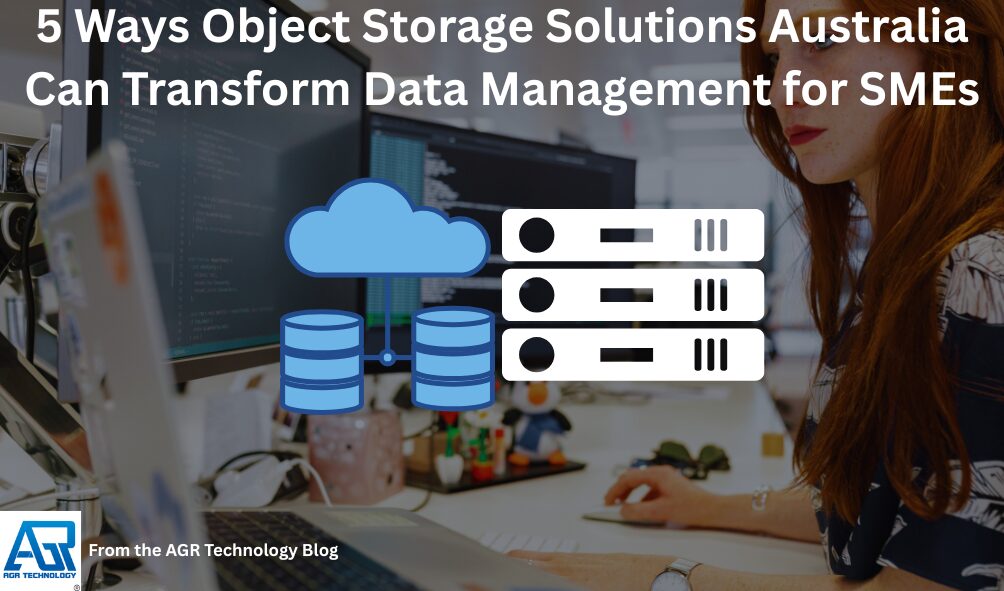Disclousure: The following content has been sponsored, the contents of this article do not necessarily reflect the views of AGR Technology
In today’s digital-first world, data isn’t just an asset, it’s the backbone of business growth. For small and medium-sized enterprises (SMEs) in Australia, managing increasing volumes of data has become both a challenge and an opportunity. Traditional storage methods like file systems or block storage often fall short when businesses need flexibility, scalability, and seamless access. This is where object storage solutions come in as a game-changer.
Unlike conventional storage, object-based systems organize data into self-contained units or “objects,” each with metadata and a unique identifier. This makes it easier to store, retrieve, and manage massive amounts of unstructured data like images, videos, documents, and backups. In simple terms, think of it as a flat object that holds computer data, eliminating the need for complex file hierarchies.
For SMEs looking to streamline operations, optimize costs, and secure sensitive information, object storage services offer a smart, future-ready approach. With reliable object storage solutions, SMEs in Australia can simplify their data management and future-proof operations.
Need robust object storage? Check out OVH
How to Transform Data Management for SMEs?
1. Simplifying Data Storage with Scalability
One of the main difficulties that small and medium-sized businesses (SMEs) face is the unprecedented growth of data. A business’s data inventory expands along with it. This data includes client information, transaction histories, multimedia assets, and more. Traditional storage can soon become a bottleneck, which can lead to performance issues and costly improvements.
Object based storage solutions like OVHcloud, Cloudian, IBM fix this problem with storage scalability. This means that businesses can start small and grow capacity as needed without having to modify everything about their infrastructure. It’s like having a storage system that grows with your business, so you can withstand spikes in data without any hassles.
Object storage vendors have built tools that automatically prepare for resource allocation and capacity. This allows small and medium-sized enterprises to focus on growing instead of keeping things running. Businesses who need data that changes all the time will find this flexibility incredibly helpful.
Object storage is a better way to store data than online cloud storage or cloud storage for small businesses. Not only does it offer scalability, but it also has storage management tools that let you keep track of and optimize how data is saved and retrieved without manual intervention.
2. Enhancing Security with Modern Protocols
It’s more critical than ever to keep your data safe as cyberattacks are increasingly getting sophisticated. SMEs are no longer “too small” to be attacked, and one breach can be very damaging. That’s why current object storage solutions use advanced data protection strategies to keep business data safe.
Encryption protocols are employed by high-end systems to keep data safe while it is being transferred and when it is not being used. Multi-factor authentication also makes files safer by making sure that only persons who are allowed to see them can do so.
Leading object storage providers also provide features that make it easy for organizations to fulfill Australian data privacy requirements without having to build up complicated processes. Industries including healthcare, finance, and legal services need this level of built-in protection.
Basic storage systems often need supplementary protection from outside sources. On the other hand, cloud object storage solutions already have these protections built in, which makes things easier for small and medium-sized organizations and gives them piece of mind.
3. Cutting Costs and Boosting Efficiency
For many small and medium-sized enterprises, money is constantly tight. Investing in massive infrastructure isn’t always practical, especially when it’s hard to foresee what data needs will be. Object storage is useful here since it gives you a fast way to store data without the expensive cost of traditional corporate installations.
There are a few reasons why the costs go down:
-
Pay-as-you-go models offered by cloud storage platforms
-
Automated storage optimization techniques make sure that resources are used well, which cuts down on waste
-
IT staff can work on strategic projects instead of maintenance activities when they don’t have to rely on manual processes as much.
It’s easy to see how effectively the top object storage solutions for enterprises with old storage operate when you compare them. These technologies help you get more work done by cutting down on downtime, making processes easier, and giving you a central place to store all your data.
For small and medium-sized enterprises trying to compete in a crowded market, this balance between cost control and performance can make a major difference.
4. Supporting Business Growth with Performance
Businesses that grow require things to happen faster and more reliably. When systems are slow, it can make workers mad, slow down work, and make consumers unhappy. This is where high-performance object storage comes in handy.
These systems leverage smart data placement and excellent caching to quickly obtain data back, even from large, unstructured databases. Whether you’re watching HD videos, managing design files, or analyzing analytics, the performance stays the same.
Businesses that wish to grow nationally or internationally may easily scale up and manage performance with enterprise data storage solutions based on object technology. A lot of businesses that sell object storage also offer managed storage. These services take care of all the hard maintenance work so that small and medium-sized enterprises can focus on what they do best.
This performance improvement makes sure that the company’s storage solution never slows it down as it grows. Instead, it helps the business grow and come up with fresh ideas.
5. Future-Proofing with Flexible Cloud Integration
In the future, it’s not just about how much space or how quick storage is; it’s also about how adaptable it is. Businesses need solutions that can operate with new technologies, hybrid infrastructures, and plans that employ more than one cloud. Object storage is a good choice here because it has an API-driven architecture and can interact with many different cloud storage services.
It is easy for small and medium-sized organizations (SMEs) to connect their storage to analytics tools, AI apps, and services from other companies. This gives us fresh options. This type of flexibility also helps with planning for business continuity because data can be replicated to other regions and providers, which makes it stronger.
If you want more control over your storage, open source object-based storage is ideal since it lets you change it without being tied to a vendor. Managed storage services, on the other hand, let organizations give up control of complicated tasks and not have to worry about them.
Object storage lets small and medium-sized enterprises remain agile and react swiftly to new trends. This makes sure that their data infrastructure will be useful for many years to come.
Conclusion
Data isn’t just a byproduct of a business; it’s the foundation of how firms work today. For small and medium-sized enterprises in Australia, being able to use this resource well can make the difference between stagnation and growth.
Object storage is a better and more dependable solution to handle the challenges that arise with current data. These solutions give organizations everything they need to be competitive, including being able to grow, being safe, saving money, and being ready for the future.
By partnering with the best object storage providers, small and medium-sized organizations (SMEs) can leverage the latest technology without using up all of their resources. In a digital world that changes swiftly, having the correct storage plan is not just about keeping up; it’s about staying ahead.

Alessio Rigoli is the founder of AGR Technology and got his start working in the IT space originally in Education and then in the private sector helping businesses in various industries. Alessio maintains the blog and is interested in a number of different topics emerging and current such as Digital marketing, Software development, Cryptocurrency/Blockchain, Cyber security, Linux and more.
Alessio Rigoli, AGR Technology
![logo-new-23[1] logo-new-23[1]](https://agrtech.com.au/wp-content/uploads/elementor/thumbs/logo-new-231-qad2sqbr9f0wlvza81xod18hkirbk9apc0elfhpco4.png)

